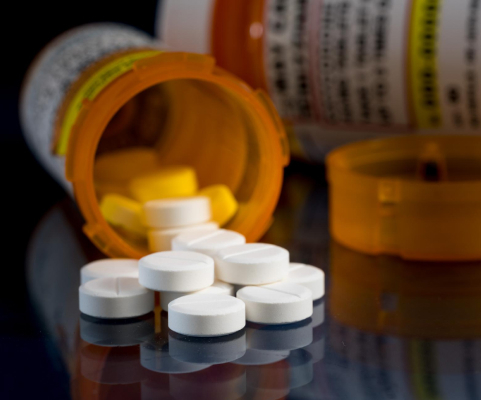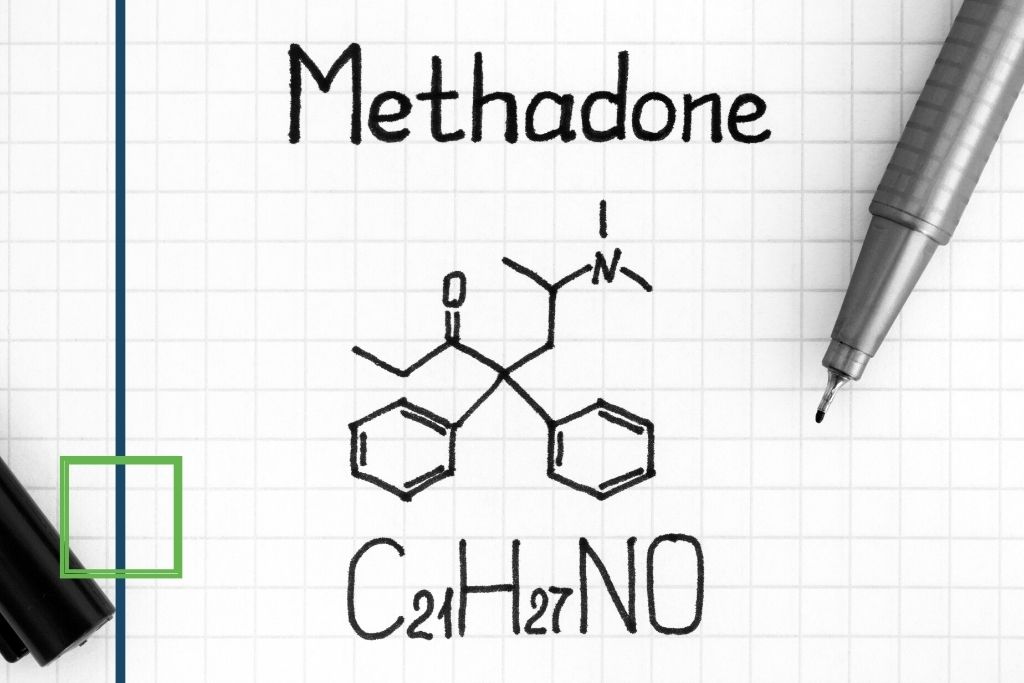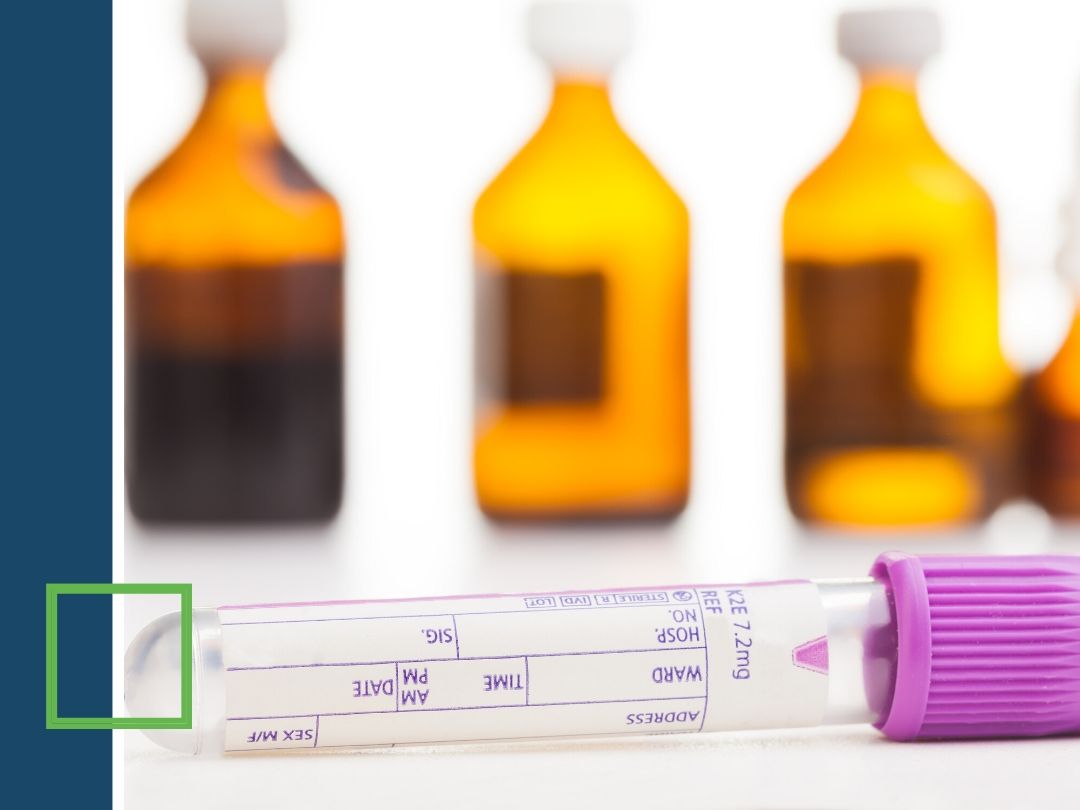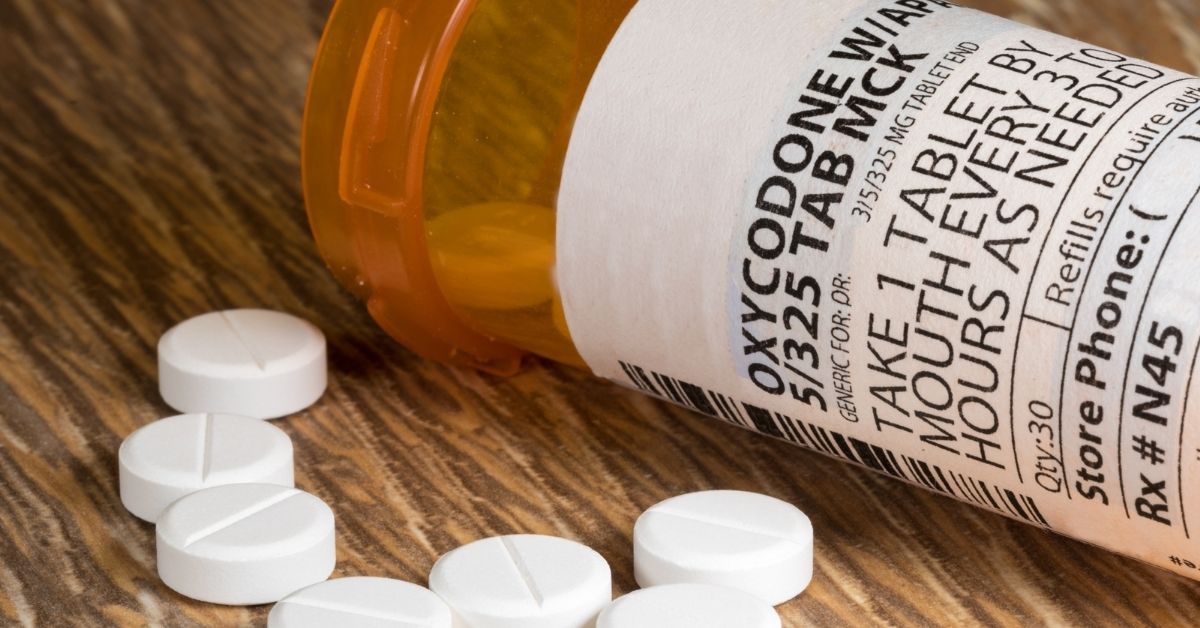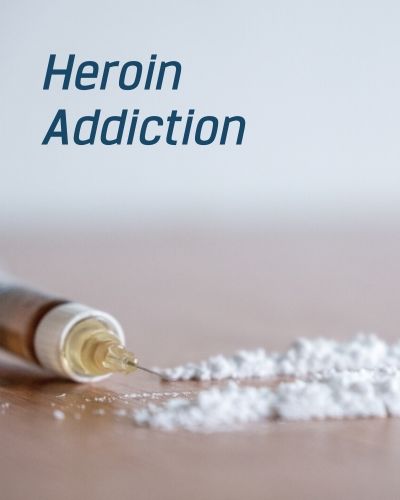
Heroin is a highly addictive opiate-based schedule II substance. The possession and use of heroin are illegal in all 50 states. Heroin addiction is extremely dangerous due to its highly addictive nature as well as the fact that it carries a high risk of overdosing or contracting a communicable disease. Although many will never escape the grips of heroin, it is possible and there is hope. The best chance at recovery is through a heroin detox and heroin treatment program.
How is Heroin Ingested?
There are multiple ways to consume heroin. This includes smoking, snorting, sniffing, and injecting the substance. As addiction to heroin progresses, an individual may start with smoking and progress to injecting it. This is because injections provide direct entry to the bloodstream and near-immediate effects are felt. In order to inject heroin, the substance is melted and injected intravenously using a syringe.
What came first, heroin or prescription opioids?
Heroin use and prescription opioid abuse are often intertwined as these drugs all have a similar effect on the brain and body. If someone uses one form of opioid, there is a greater chance they will end up using another. One question in our society is “do addicts start with heroin then move to prescription opioids or the other way around”? People who are prescribed opioid pain medication and develop a dependence may turn to heroin as a cheaper and possibly stronger option. In fact, nearly 80 percent of heroin users have partaken in prior misuses of prescription opioids.
When it comes to getting high regularly, some data does suggest that heroin is the first opioid many people use. One report documented that about a 3rd of users turned to heroin first. Individuals who use heroin and were not previously prescribed pain pills may consume prescription opioids at some point, however, they are likely to have received them via illegal means.
Effects of Heroin Use
Simply put, the immediate effects of heroin use are that of a euphoric high. Other immediate effects include dry mouth, flushed skin, an increase in body temperature, and arms and legs feeling heavy, in addition to nausea, vomiting, and itching. Short term effects that often present in the hours following use include drowsiness, compromised mental function, slowed heart rate, and slowed breathing.
Extended use of heroin can lead to a number of harmful effects physically, mentally, and socially. For one, addiction and physical dependence commonly develop for those who use this substance. Long term health effects of heroin abuse may include compromised immune health, decreased bone density, and potentially permanent brain damage. Other effects include financial issues, career challenges, and difficulty maintaining social relationships. Heroin use can turn someone’s whole life upside down.
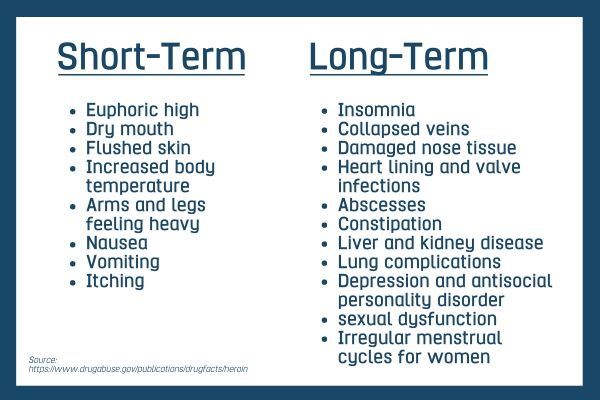
Heroin Addiction Treatment
There are multiple ways to treat heroin addiction. Medication such as methadone, Subutex, and Suboxone allows an individual to be weaned off of heroin without the full withdrawal effects. Medication-assisted treatment is controversial as these medications are addictive in themselves. The ideal treatment option is abstinence. This is a difficult route, as heroin detox can be very uncomfortable and triggers severe cravings. However, getting clean is the ultimate goal and this is the preferred route for many.
Our team at Level Up Treatment specializes in creating an ideal environment and providing effective therapies to help heroin addicts through their recovery. We will develop a personalized treatment plan and lead you to recovery. Get started today!
Heroin Detox
We Make Heroin Detox Easier On You
The major issue with heroin, and opiates as a whole, is that they are extremely addicted substances and it is very easy to get hooked. Individuals who use these substances experience chemical changes in their brain and often dodge the honest truth about their addiction. This means is it often family and friends who eventually detect signs of heroin use. It is not easy getting a loved one to admit they have a heroin addiction and finding a heroin detox program, but it could save their life.
The most obvious way for a user to identify that they have a heroin dependency, and probably an addiction, is when a powerful withdrawal symptom is experienced: cravings. Unfortunately, a user who experiences this symptom may already be in late-stage addiction and facing a challenging recovery process.
One of the most common forms of heroin use is via intravenous injections. When injected, the drug effects are fast-acting. Injections direct the substance right into the bloodstream, triggering a rush of euphoria. Other effects that are quick to present include dry mouth, pale flushed skin, constricted pupils, slowed respiration, and a lack of consciousness. Thoughts and memories become difficult to form or hold on to. The ability to make decisions and maintain self-control is greatly impaired. Heroin use also takes a great toll on the user’s immune system, making them susceptible to frequent colds and infections.

Heroin Withdrawal Symptoms
- Nausea
- Sweats and chills
- Soreness and aching in muscles and bones
- Sinus issues
- Fatigue and loss of energy
- Agitation and restlessness
- Vomiting and diarrhea
Severe Cases of Heroin Addiction
- Strong cravings
- Depression
- Anxiety
- Increased heart rate
- Anxiety or paranoia
- Muscle spasms
- Respiration issues
- Psychological stress
- High blood pressure
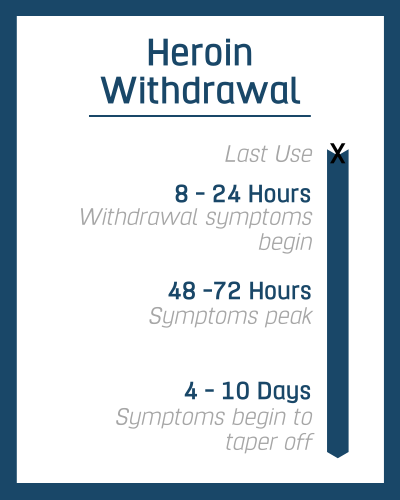
What to Expect During Heroin Detox
The heroin detox process may look different from someone who has only used heroin a few times than it would for a person who has used heroin habitually over several weeks, months, or years. The longer and great amounts an individual uses, the more severe the process will be and the longer it will take to fully detox. In addition to these factors, how the substance was ingested can also play a role in affecting how dependent the brain and body have become on the drug, as well as the overall detox process.
For some individuals, the detox period is over within 5-7 days. However, more advanced heroin addiction could mean a detox period several days longer. Therapy, counseling, and medical treatment are all parts of a medically assisted detox program. This type of structured and supervised detox program helps create a smoother transition off the drug and reducing the risk of complications.
How to Spot Heroin Addiction
Regardless of the substance used, addicts often try to hide their drug use. They may wear clothing to hide track marks created by using needles to inject heroin intravenously. They may store heroin paraphernalia in discrete locations, such as small glass pipes, small plastic baggies, burnt spoons, used syringes, and white or tan powder residue. Heroin use is also notorious for causing constipation, so the user may consistently seek out laxatives.
In addition to these signs, someone who is addicted to may disappear and be unreachable for long periods of time in order to use in privacy. If they are around others when they come down off of a heroin high, they may be irritable and begin to exhibit other visible withdrawal symptoms.
Risks of Heroin Addiction
Heroin addiction is a dangerous addiction for a number of reasons. Namely, how the disease progresses. With continued use over time, the euphoric high becomes less and less powerful. As they chase this high, it gets worse and worse. Eventually, the addiction becomes so progressed that the main motivation for getting high is to avoid the onset of severe withdrawal symptoms. This is when heroin addiction stops being fun or exciting, and the nightmare begins and intensifies each time the last dose of heroin wears off.
The chemical composition of heroin is toxic and causes long term health effects. Harmful effects include permanent damage to blood vessels, the brain, lungs, kidney and liver. It can also cause long term damage to the brain, leading to memory loss and decreased cognitive function.
The effects of heroin use are not strictly health-related. In the drawls of addiction, the user often puts stress on their relationships, careers, and overall day to day life. Getting their next fix becomes more important than anything else in their life, including eating and bathing. They may not be aware of the damage that they are causing along the way, and even if they are, they may not be able to stop using without the proper addiction treatment.
- Low energy, tendency to doze off
- Breathing that is slow
- Pupils appear small
- Skin looks flushed
- Runny nose and cold symptoms
- Tendency to itch and scratch
- Nausea and vomiting
- Constipation
- Impaired speech
- Loss of appetite
- Neglecting hygiene and grooming

Common Health Risks
- Heart damage and infection to lining and valves
- Lung Damage
- Dysfunctional Cognitive Abilities
- Kidney disease and possible failure
- Infections due to needle sharing (HIV, Hepatitis)
- Collapsed veins
- Skin infections and abscesses
- Liver disease
- Complications to the lung
- Pneumonia
- Complications of the lungs
Risk of Heroin Overdose
Getting treatment to stop using heroin is so critical because of the high risk of overdose. Although drugs such as Naloxone have been created to prevent death from overdose, the rates of overdose from heroin use are still astronomical. A heroin overdose causes hypoxia: a sharp decline in breathing which in term prevents the flow of oxygen to the brain. In some cases, an overdose can lead to coma, brain damage, and possibly death.
Heroin addiction is a deadly, life-threatening disease that can lead to irreversible effects on one’s health and relationships. Without help, this addition will more than likely turn deadly. Immediate professional help and heroin detox is the only way to avoid harm to yourself or a loved one.


